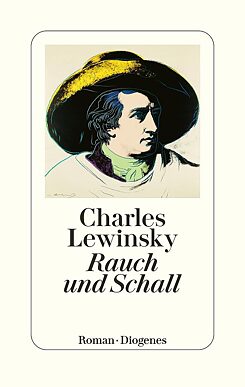Cherrypicker
Goethe gets writer’s block
Anyone tired of the cult of Goethe’s genius should read Charles Lewinsky’s satirical novel in which the great poet and writer is plagued by all-too-human problems.
By Holger Moos
Johann Wolfgang von Goethe is regarded as the German poet per se. Even during his lifetime he was admired for his erudition and seemingly inexhaustible productivity, and has been worshiped almost like a god by succeeding generations. Not only is Goethe the prototype of an entire literary epoch that encompasses both Classicism and Romanticism – indeed the epoch was named in his honour the Age of Goethe.
The Swiss author Charles Lewinsky is well versed in literary adaptations of historical material. In his Jewish family saga Melnitz (2006), for example, he tracked the history of Jews in Switzerland across four generations. Halbbart (2020), a novel set in the thirteenth century, was longlisted for the German Book Prize and nominated for the Swiss Book Prize. Sein Sohn (2022) is set in the first half of the nineteenth century and tells the tragic life story of an orphan boy who believes himself to be the son of the French king.
An itchy bottom
In Lewinsky’s latest novel Rauch und Schall (Smoke and Sound), we experience a very human Goethe right from the outset: the prince of poets is plagued by haemorrhoids. It is the year 1797 and Goethe is just returning to Weimar from his third trip to Switzerland. The inspiration he hoped to gain from the journey has failed to materialize; he has dictated just a few feeble ideas to his secretary Geist, “whose deadpan servant’s face caused any flash of inspiration to evaporate like damp powder in a pan”.It quickly becomes clear that an itchy bottom is the least of Goethe’s problems. When Duke Carl August, Goethe’s employer in Weimar, requests him to compose a poem to celebrate the duchess’s birthday, Goethe has to concede that he is no longer “kissed by the muse”. Suffering from a serious bout of writer’s block, he simply cannot get anything down on paper. Naturally, this must never become public knowledge, as otherwise he risks jeopardizing his reputation.
Help from a prolific writer
Now, good advice doesn’t come cheap. He confesses his problem only to his lover (and later wife) Christiane Vulpius. Her brother Christian August Vulpius, though a library clerk, churns out one light novel after another to boost his paltry salary. In principle, Goethe has nothing but contempt for this “prolific writer who was not born to true art”. As time is of the essence and his literary mental block persists, however, Goethe reluctantly accepts Christian August’s offer to help the master out with a few verses.When the duke, who has romantic designs on a court actress, orders a love poem from Goethe shortly afterwards, it is once again Vulpius who comes to Goethe’s aid. By now it is clear that this cannot be any sort of permanent solution, especially as the duke is bound to ask Goethe sooner or later how he is progressing with the promised masterpiece Faust.
Lewinsky’s Rauch und Schall is a highly amusing novel with many successful dialogues. In it, Goethe is revealed as someone who not only suffers from physical ailments but is anything but free of vanities and craves acknowledgement and recognition from others – especially the ruling aristocratic class. And that’s not all: for all he looks down his nose at the writer of light literature, he is also reliant on his help. Even the solution to the writer’s block comes in the form of an old “household remedy” from Vulpius’s grandmother. It is not least Christiane, whom Goethe loves but undervalues, who deftly arranges the Mephistophelian bargain between her future husband and her brother. She knows that it is sometimes wiser to pretend to be more stupid than one is and to let the two men speak first so that they can indulge their evident passion for mansplaining: “Both love to explain things to other people.”
A normal human level
In the end, Vulpius claims that the great poet is suffering from something that today might be termed pathological perfectionism: “Your problem could have something to do with the fact that you want everything you write to be important and meaningful”. He recommends that Goethe should give up this ambition in order to find his way back to poetry. By way of practice, Goethe is supposed to tackle a story that Vulpius hasn’t yet elaborated. And so Goethe begins to write a “penny dreadful packed with adventure and romance”. As this is really beneath his dignity, he takes to writing secretly in the garden pavilion so as not to desecrate his study with such inferior scribblings. Nobody is ever supposed to hear about it.Let us not think too much about why this book, entitled Rinaldo Rinaldini and penned by a certain Vulpius, was published in 1801 and turned out to a major success. Whatever the reason, the writing therapy had a positive effect on Goethe’s mood and on his haemorrhoids.
Lewinsky clearly enjoys trimming the great Goethe down to a more normal human level. The outcome is a tongue-in-cheek story that is a lot of fun to read.
Charles Lewinsky: Rauch und Schall. Roman
Zürich: Diogenes, 2023. 304 p.
ISBN: 978-3-257-07259-4
You can find this title in our eLibrary Onleihe (also as audiobook)
